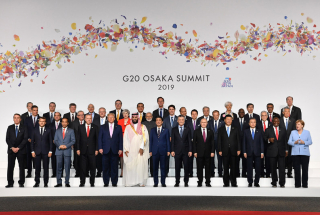Japan’s strategic opportunity at global leadership

Author: Shiro Armstrong
Saving the multilateral order, navigating great power competition and a time for global leadership: Japanese style
Japan has taken up the G20 presidency at a key time in global economic affairs and has the opportunity to shepherd the global economy through a period of greater uncertainty than there has been in many decades. But the task is tough. Not only are the issues on which progress must be made substantial, but also the G20 presidency will effectively be one of the shortest ever, with Leaders meeting in the middle of 2019. f the goal of Japan’s G20 presidency is merely to get through a successful summit in June with a business as usual approach, at best it would be a lost opportunity. At worst, Prime Minister Abe and Japanese officials could find the global economic order collapsing around them on their watch, or throwing a hospital pass to the next G20 hosts, Saudi Arabia.
Tensions between China and the United States, the world’s two largest economies, are disrupting the global economy. Even if the two reach some kind of bilateral settlement there’s likely to be systemic damage. Managing the rise of China is difficult enough for the global community but with the multilateral order under threat from President Trump’s America First agenda, it is worse.
Japan is the world’s third largest economy, one of America’s most important allies. It shares one of the world’s largest bilateral economic relationships with its neighbour China. That puts Japan in a unique if excruciatingly difficult position to navigate the defining challenges the global community faces today.
Simply getting by at the Osaka G20 Summit is hardly likely to be enough.
Read the entire article on the RIETI website
Photo taken by the OECD and sourced from Flickr.
Updated: 19 April 2024/Responsible Officer: Crawford Engagement/Page Contact: CAP Web Services Team










